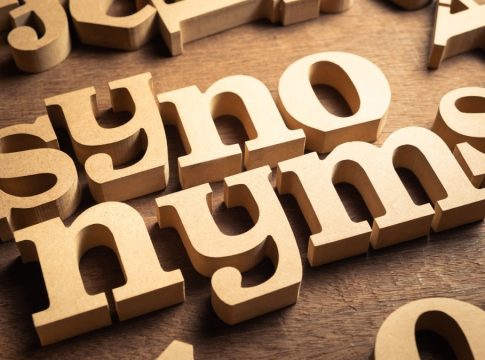A synonym is a word or phrase that carries the same or very similar meaning to another word in the same language. For example, “happy” and “joyful” are synonyms.
The Nuances of Synonyms
While synonyms share similar meanings, they aren’t perfect duplicates. Here’s how they can differ:
- Subtle Shades: Synonyms can have slight variations in meaning, formality, or connotation. Consider “happy” and “joyful.” “Happy” suggests a general state of contentment, while “joyful” expresses a more intense feeling of exhilaration. Similarly, “large” and “immense” both describe size, but “immense” implies something much bigger.
- Part of Speech Flexibility: The beauty of synonyms is that they can belong to any grammatical category. You can find synonyms for nouns (e.g., “house” and “dwelling”), verbs (e.g., “run” and “dash”), adjectives (e.g., “big” and “large”), adverbs (e.g., “quickly” and “rapidly”), and even prepositions (e.g., “above” and “over”). This allows you to swap words and maintain your sentence structure while adding variety.
- A Reflection of History: The English language’s rich history of borrowing words from other languages has contributed to its wealth of synonyms. Many synonym pairs reflect the historical coexistence of Anglo-Saxon and Norman French. For example, “cow” (Saxon) and “beef” (French) both refer to the same animal, but with a difference in origin. This interplay of languages has gifted us with a diverse vocabulary and multiple ways to express the same idea.
Beyond the Basic Definition
The concept of synonyms extends beyond simply finding identical meanings:
- Imperfect Matches: Some argue that true synonyms with exactly the same meaning are rare. Social context, formality, and subtle differences can influence a word’s meaning. For instance, while “wet” and “damp” are synonyms, “wet” might be used to describe clothes hanging outside after a downpour, while “damp” might be used for a slightly humid basement.
- Emotional Nuances: Synonyms often carry slight variations in connotation or emotional weight. For example, “skinny” and “thin” might both describe someone’s body type, but “skinny” can sometimes hold a negative connotation, while “thin” is more neutral. Considering these emotional nuances can make your writing more impactful.
- Thesaurus as a Tool: A thesaurus is a valuable resource for finding synonyms and related words. However, it’s important to consider the specific context when choosing a synonym. A thesaurus might provide “angry” as a synonym for “mad,” but “mad” might not be the most fitting choice depending on the situation.

A World of Related Words
As you explore synonyms, you’ll encounter other interesting vocabulary terms:
- Antonyms: These are words with opposite meanings, like “happy” and “sad” or “large” and “small.”
- Homonyms: These are words with the same spelling or pronunciation but different meanings (e.g., “bat” as a flying creature or a wooden club).
- Hyponyms: These are more specific words within a broader category. For instance, “dog” is a hyponym of “animal.”
- Hypernyms: These are general terms encompassing more specific words. For example, “animal” is a hypernym of “dog.”
Understanding synonyms and their nuances adds variety and precision to your writing and communication. So, the next time you reach for a familiar word, consider a synonym to explore the richness and expressiveness of language. By choosing the perfect synonym, you can elevate your writing and ensure your message is clear and impactful.
A synonym is a word or phrase that carries the same or very similar meaning to another word in the same language. For example, “happy” and “joyful” are synonyms.
The Nuances of Synonyms
While synonyms share similar meanings, they aren’t perfect duplicates. Here’s how they can differ:
- Subtle Shades: Synonyms can have slight variations in meaning, formality, or connotation. Consider “happy” and “joyful.” “Happy” suggests a general state of contentment, while “joyful” expresses a more intense feeling of exhilaration. Similarly, “large” and “immense” both describe size, but “immense” implies something much bigger.
- Part of Speech Flexibility: The beauty of synonyms is that they can belong to any grammatical category. You can find synonyms for nouns (e.g., “house” and “dwelling”), verbs (e.g., “run” and “dash”), adjectives (e.g., “big” and “large”), adverbs (e.g., “quickly” and “rapidly”), and even prepositions (e.g., “above” and “over”). This allows you to swap words and maintain your sentence structure while adding variety.
- A Reflection of History: The English language’s rich history of borrowing words from other languages has contributed to its wealth of synonyms. Many synonym pairs reflect the historical coexistence of Anglo-Saxon and Norman French. For example, “cow” (Saxon) and “beef” (French) both refer to the same animal, but with a difference in origin. This interplay of languages has gifted us with a diverse vocabulary and multiple ways to express the same idea.
Beyond the Basic Definition
The concept of synonyms extends beyond simply finding identical meanings:
- Imperfect Matches: Some argue that true synonyms with exactly the same meaning are rare. Social context, formality, and subtle differences can influence a word’s meaning. For instance, while “wet” and “damp” are synonyms, “wet” might be used to describe clothes hanging outside after a downpour, while “damp” might be used for a slightly humid basement.
- Emotional Nuances: Synonyms often carry slight variations in connotation or emotional weight. For example, “skinny” and “thin” might both describe someone’s body type, but “skinny” can sometimes hold a negative connotation, while “thin” is more neutral. Considering these emotional nuances can make your writing more impactful.
- Thesaurus as a Tool: A thesaurus is a valuable resource for finding synonyms and related words. However, it’s important to consider the specific context when choosing a synonym. A thesaurus might provide “angry” as a synonym for “mad,” but “mad” might not be the most fitting choice depending on the situation.

A World of Related Words
As you explore synonyms, you’ll encounter other interesting vocabulary terms:
- Antonyms: These are words with opposite meanings, like “happy” and “sad” or “large” and “small.”
- Homonyms: These are words with the same spelling or pronunciation but different meanings (e.g., “bat” as a flying creature or a wooden club).
- Hyponyms: These are more specific words within a broader category. For instance, “dog” is a hyponym of “animal.”
- Hypernyms: These are general terms encompassing more specific words. For example, “animal” is a hypernym of “dog.”
Understanding synonyms and their nuances adds variety and precision to your writing and communication. So, the next time you reach for a familiar word, consider a synonym to explore the richness and expressiveness of language. By choosing the perfect synonym, you can elevate your writing and ensure your message is clear and impactful.

